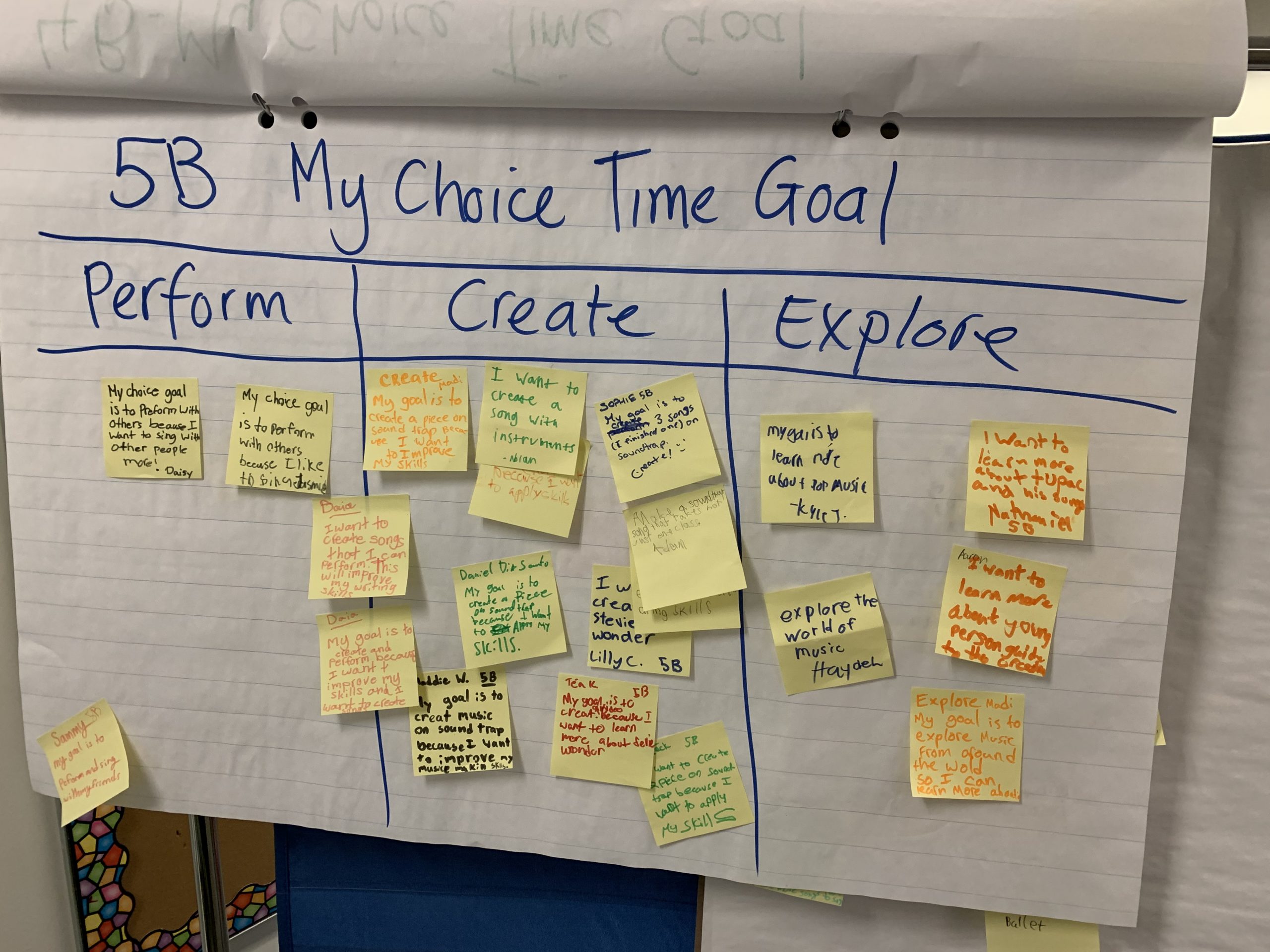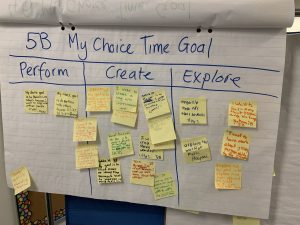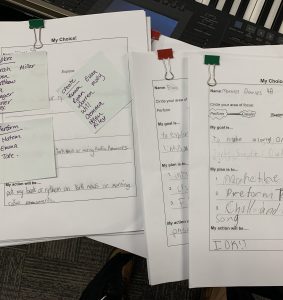Grade 5 students love the opportunity to choose their own adventure in music. I am all for it, but there are obvious challenges that immediately come to mind. How can I make sure they stay on track? How can I keep all twenty-two students accountable, on track and help them achieve their goals? Did I mention there are two classes?
How might we manage and assess student-directed learning in Grade 5 music? Immediately following the last F2F, I front-loaded what a”My Choice” type project could look like with both Grade 5 classes. We talked about what that would look like and what would not be an appropriate use of the time.
In a Google Form, all students answered these questions. “What would you like to learn more about in Music? How would you share that knowledge, performance or composition? All their responses landed in one of three components; Perform, Create and Explore. Now that I knew the directions the students wanted to go, I took a few weeks to think about what to do about it. We were in the thick of rehearsals and concert performance mode for the last couple of weeks anyway, so it was ideal to take a step back from this for a while.
On the first week back after the break, I gave the students a sticky note and asked them to write their “My Choice” goal and then post it on the chart under one of the following headings; Perform, Create and Explore.
Now that students had their goal in mind, I asked them to think about an action component. How would they share their learning? Who would hear their performance or their composition?
I created a “My Choice Plan” document that contained their goal, the action and the steps they could take to get there. After much thought about the best format for this activity, I decided a hard copy would be the most effective for this. Students need to see this in front of them rather than out of view on a tab on a device in order to stay on track and accountable, especially in my progress conversations with each student.
They filled it out their document in pencil, which allowed for revisions to be made. It also serves as a means for me to offer feedback and to provide guidance for next steps. Some students wanted to collaborate with a partner, so this became part of their plan. Plans can change or take a new direction, within reason.
We have Fridays A and B where all classes have an additional 45 minutes of music every other week. My intention is to use this time consistently, but also have the flexibility to turn to this work on other days, if I am away on PD, for example. How can students keep track of their progress between classes so they can always move forward?
Google slides works beautifully for this. They created a Slide Deck to track their “My Choice” Plan progress. Every class they create a new slide and include the date. On each slide they add links to their research, videos they looked at as well as writing a sentence or two describing what they did or learned about and what they will do next class to move forward.
There have been two classes dedicated to this so far and all students are engaged. Some have chosen a large goal like composing a jingle for York Radio, or a smaller goal to improve reading notation and achieve a perfect score on Breezin Thru Theory. Students like this flexibility and feel that their goals are achievable.
I now rotate around the room or outside in the hallway as students work and I have one-to-one conversations about their goal and how best to achieve it. They ask for guidance about where to find information or how to use various tools or play a particular chord on ukulele etc. They ask me, or one another. Positive teacher-student relationships and student to student relationships are being strengthened. They are asking wonderful questions and sharing new discoveries they are excited about. Next week, the plan is to share their work-in-progress with a peer, get some feedback, which I will also contribute to and then decide what needs tweaking moving forward.
So far so good.



Hey @lyorke,
This sounds more than “so far so good”, this sounds like very far, and very good. Student-directed learning is perhaps the most difficult AND the most rewarding teaching and learning initiative one can attempt in the classroom. A huge amount of trust protocol is often required at the beginning of such a venture, and that often seems like wasted time. It’s not. As you’ve already observed, extending responsibility often reveals greater accountability. Google Slides is everyone’s friend these days, and for good reason.
My biggest takeaway from your HMW here is the positive relationships that seem to be forming between students and teachers and teachers and students. I would go out on a limb here and say this is the purpose of teaching. To empower and foster these relationships that we know lead to greater confidence and intrinsic motivation.
Keep up the great work!
Eric
Thanks Eric for your kind and encouraging words. Yes, the trust component is huge. There was quite a bit of front-loading around this in the first term when students were given time in class for independent rehearsal using resources I created for them to practise songs and pieces for the concert. In order to have this “My Choice” opportunity, students need to be trusted to stay on task and use their time productively. Hapara is also my friend here for this. I am learning quite a bit about current music and artists from the “Explore” group and extending their learning by asking questions like “Why do you think it’s important for me to know about this artist or piece?”
@lyorke
The “Perform—Create—Explore” components are such concise ways of framing a variety of options in music. (I also think it is really cool that “create” seems to be the most popular goal choice: awesome!)
Is the peer mentorship piece something that this class has always been strong at, or did it seem to develop out of this choice plan activity? It can be such a powerful learning tool!
I hope you keep us updated as your students continue to work toward their goals!
Thanks Jess!
Peer mentorship is something we have been working on last term. Instead of rehearsing repertoire with the full group all the time, I created resources in a Google Drive folder so students could rehearse independently or in groups. Students could ask another “expert” student to show them how to play a recorder piece, xylophone pattern, or vocal part. This was successful and meant that when we rehearsed as a full group, we could focus on the expressive part of the performance, rather than just the notes and rhythm. Yes, it is great that quite a few students chose to create. Most of these action plans involve using technology “Soundtrap” or “Garageband”, but there are others that involve live instruments and singing.
It makes me so happy to see that students have a desire to create and explore in music. I think in school, we often only focus on the performative aspect of music rather than what they will be able to do. Students will only love music with this approach!
Is there a plan to record the conversations and to keep track of their progress? This would surely help parents see the value of what you are doing. Has your relationship with the students changed since introducing this?
I want to be in your class…. As a teacher to see how this progresses, but also as a student because this sounds fun!
Thanks Andrew! As am IB PYP school, student agency is an expectation. To be honest, incorporating this in Music class can be challenging, along with performance demands also. The final product at the end of the process is often the only component parents and the community see and hear. Our school has reduced the number of expected formal performances, which has helped. We now include “works in progress” at some assemblies where only students and faculty are in attendance. I have an iPad on hand to capture conversations/spontaneous performances I come across. Students are also responsible for documenting their progress on a new slide every class. They tend to only want to record positive moments and are reluctant to write about a struggle or a challenge. It’s okay to realize something is not working, but we need to see it documented in the progress and then they can look back and see how they managed to move on. Due to the fact that we have experimented with the concept of ‘choosing their own adventure” from time to time since grade four, my relationship with the grade hasn’t changed much. I have noticed that students think of me as a resource rather than making decisions for them. Mind you, there are some students who would prefer if I told them what they need do next. They are having fun with this.